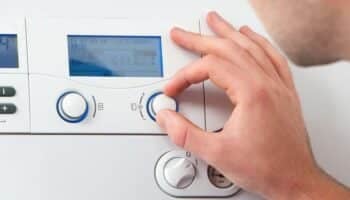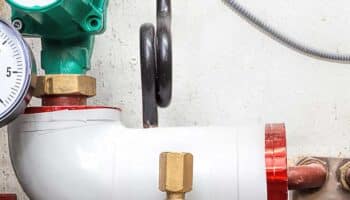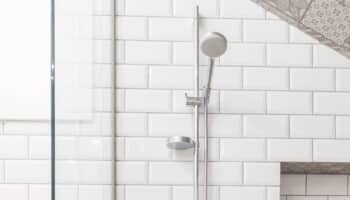Bill.
For most of us, that’s a painful four-letter word that we’re faced with on the regular.
A long as amenities exist and humans rely on water for drinking and household usage, our water bills are unfortunately a fact of life.
Math not your strong point? Bills and bits of paper shoved everywhere but never where you can find them when needed? Household admin making you pull your hair out and feel totally overwhelmed by it all?

Well, we’ve got you’ve covered!
Let’s demystify this whole water bill business and get you on track to easy peasy lemon squeezy household management.
We’re going to give you an overview to help you get that water bill estimated and budgeted for.
Bear in mind this is a general guide as each American city/county will have its own procedures and billing processes in place, which is why you need to check with your local authority.
Step 1: Find Your Last Water Bill
Estimating an upcoming water bill is an essential part of any household budget.
Knowing your historical (past) water usage and the rates in your area normally charged allows you to put the funds aside and avoid unpleasant surprises.
If you can, grab a recent bill – ideally one for the month/billing period you’ve just had. If you don’t have a paper copy handy, you should be able to find one online via your water company.
Step 2: Find Out How Much Water You’ve Used
Using your water bill as your guide, look at the amount of water used. This is usually given on your bill in gallons or cubic feet.
(748 gallons = one hundred cubic feet of water)
Your water bill should include your meter number and water usage information based on your meter reading. At the very least, it should include the current and last meter readings and the dates those readings were taken.
Normally your bill will show the number of days in the billing period, and the number of gallons or cubic feet of water used.
Calculate your water usage by deducting the current/latest meter reading from the previous reading. The amount you come up with will be a rough estimate of your usage for the next month.
If you’re only part-way through a month, divide this difference by the days of the month which have already passed, then multiply by the total days in the month. This will give you a prediction based on what you’ve used so far.
Account for Time of Year
Your water usage is not at the same level throughout the year.
People tend to use significantly more water during the summer months on things like filling your pool, and irrigating your garden. To account for this, budget an additional 50% of the total usual bill amount during the summer months just to be on the safe side.

As a rough figure, the average American household will use 90 gallons of water per day per person in the household. That sounds like a lot, and it is. We’ve included some handy water saving tips later on in the article.
Pro – tip: Big fluctuations in your water bill (if the number of people in your household hasn’t changed) could indicate a faulty meter or a leak within your/neighboring water lines. Query any discrepancies with your water provider.
Step 3: Look Up Your Local Rates
Water rates charged can vary quite a bit from county to county, so you need to verify your local water rates with your municipality AND account for any recent or upcoming changes in their pricing structure.
Many areas in the U.S have seen a steep increase in their water rates due to aging waterworks infrastructure, so contact your municipality and confirm what rate you are being charged presently per unit of water measurement (by the gallon or by the cubic foot) AND whether that figure is likely to change.
To calculate a potential bill, simply take your usage estimate for this month and multiply it by the unit rate.
For example: You’ve used 1,000 gallons during your last billing period.
The price of water in your area is 4 cents per gallon.
1000 x 0.04c = $40.
Your bill should have all this information clearly displayed as to how the provider calculates your bill. If you’re still in doubt as to whether you may be paying too much or suspect a faulty/inaccurate meter reading, contact your local municipality/water service to query this. There should be an office number for queries marked clearly on your water bill.
Step 4: Confirm Previous Bill Amounts, and Estimate the Next One
If you have all or most of your water bills filed in one place, it’s worth a check through to confirm what your average ‘spend’ is on water.
Once you’ve got a rough figure worked out, always budget about 25% MORE than that during the cooler months (to allow for cost increases) and 50% MORE than that during the summer months (to allow for increased usage and cost increases), just to be on the safe side.
If you’re new to the area or have just moved in, the municipality or neighborhood association will have all the information you need regarding local water rates and billing practices. They can help you to understand what you’re likely to spend.
If you’re renting, the landlord or rental agent should have no problem providing this information to you – and you should insist on it. It”s part of their responsibility to you as a tenant.
If you’re buying a house, it is always wise to talk to the previous owners or the sales agent BEFORE YOU BUY about the property’s previous water bills – you can get an idea of water consumption and the costs involved for that property straight from the horse’s mouth and avoid a nasty shock later. The previous owners or sales agent can also educate you on finding the meter and any potential meter problems you may have if you decide to buy.
Resources to Help You with Water Bills
To get information and specific water rates for your area, look online, call directory enquiries, or visit your local municipality building for assistance. If taking the online route, simply Google (insert city name) followed by ‘Water Department’.
Example: If you live in Tulsa; Oklahoma you’ll Google –
Tulsa Water Department
And your internet search engine will bring up your local listings for Water Department email, phone, fault reporting and so on. Don’t search Water Departments or Public Works by state, as each city/country/township within that state will have its own dedicated department, so you need to be specific to the city.
Other Useful Links
Cut Your Water Bill like a Pro
In many regions of America water rates have climbed dramatically with one study of 12 U.S cities showing an 80% jump in water and sewage rates between 2010 and 2018.
Water certainly doesn’t look like it’s going to get cheaper, so here are some tips to help you save, both your cash and the environment:

- Fix your leaks – leaks in your plumbing and irrigation systems may be tiny but the water lost adds up, and you’re paying for it
- Turn off the taps while you’re shaving or brushing your teeth
- Showers use less water than bathing, as long as they’re quick!
- Plug the sink or use a washbasin if you wash dishes by hand
- Only run the dishwasher when it’s fully loaded
- Scrape plates instead of rinsing them before they go into the dishwasher
- Keep a pitcher of water in the fridge to keep cold instead of running the faucet until the water cools
- Thaw food in the fridge overnight instead of using running warm water to thaw it
- Add food waste to your compost pile instead of into your garbage disposal – good for your water bill and your garden!
- Consider planting your garden with succulents, cacti and plant varieties that need very little water to thrive. You’ll end watering a lot less and still have greenery to admire
- Check that garden sprinkler systems are working effectively and on timers if possible. Make sure that the water is going where it’s needed, and that sprinklers aren’t just left to run all day. Also, check your irrigation system for leaks regularly
- Sweep outside areas rather than hosing them off
- Use a pool cover – it saves hugely on water evaporation from the pool
Conclusion
Thank you for joining us at Appliance Analysts, we hope that this general guide to water bills and resources has helped you.
Remember, every city in the U.S has its own system in place for water administration and billing, so do contact your local Public Works/Water Department and get information that’s specific to your location.
We look forward to seeing you next time!







